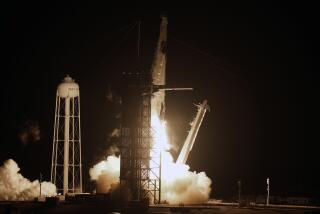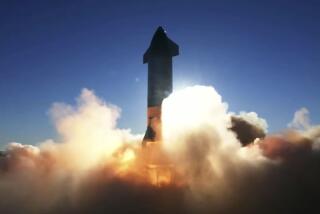Cooperation Can Rebuild Our Civilian Space Role
- Share via
The United States once was the only superpower that was open about its space program. From the beginning, U.S. launches were shown live on television. While full disclosure had embarrassing and tragic moments, it added greatly to the effect of successes. It also promoted support for space activities and recognition of American leadership--in the years when the United States was ahead.
Now the Soviet Union has started to practice glasnost , or openness, in space. Not only have the Soviets started to televise their liftoffs, but also in recent weeks they have given extensive publicity to two missions that got into serious trouble: a near-disaster that occurred in bringing two cosmonauts back to Earth, followed by the failure of an automated spacecraft that was launched in July to probe the moons of Mars. In both instances Soviet officials quickly acknowledged error.
This Soviet candor is welcome to those of us who believe that the United States and the Soviet Union should work together in exploring space.
Yet it is also coming at a time when the United States is delaying and cutting back on the open scientific portion of its space program and emphasizing the military side instead. In the aftermath of the Challenger accident our civilian space agency has placed increasing priority on military payloads. The National Aeronautics and Space Administration currently plans for nearly half the space-shuttle launches during the next two years to be Pentagon missions.
Although it has not launched a major scientific mission in 10 years, NASA keeps delaying its most important space exploration projects. For example, the Hubble space telescope, which will significantly expand scientific understanding of the universe, will not be launched before 1990 --40 months later than originally scheduled--and the Mars observer mission has been postponed until 1992.
Certainly there are national-security and budgetary reasons for deferring some of these civilian missions. The grounding of the shuttle since 1986 left a huge backlog of unlaunched military and intelligence satellites. Arms-control agreements with the Soviets require, more than ever, an improved verification capability provided by satellites.
Yet there is also a huge backlog of U.S. civilian satellites waiting for launch. This month the European Space Agency’s Ariane rocket orbited two American communications satellites. In another irony, China’s Long March missiles will soon start launching American-built satellites. While some Americans are obviously distressed by reliance on foreign space programs, we see it as a positive development in international space cooperation.
The Soviet Union would also like some of this U.S. civilian business. Yet the Reagan Administration so far has forbidden American corporations from launching satellites on Soviet boosters, fearing that valuable technology will leak if Soviet services are used.
Still, the United States would seem to have at least as much to gain as to lose in dealing with the Soviets. The United States clearly trails the Soviet Union in space operations, and it is quite unlikely that, in this time of huge budget deficits, Congress will foot the bill to catch up.
We strongly believe that the time has come to take a fresh look at space exploration, particularly because financial reality rules out major movement forward under current policies.
An important first step would be to make a clear separation between military and civilian space programs. For the foreseeable future the U.S. government will need to maintain space-based surveillance and support activities related to national security. Neither a Bush nor a Dukakis Administration is about to renounce the military use of space.
The new President would be wise to follow a policy that enables him to deal with the military side of space from a “keep-up-the-guard” adversarial stance while treating the civilian aspects in a cooperative mode. Fortunately, the Soviets have repeatedly said that they do not want to compete, and they have offered to cooperate with the United States both in exploring Mars and in placing American experiments on board their Mir space station. The United States has accepted neither proposal, even though the Soviets are way out in front in both planetary exploration and orbiting space stations. It would seem that Washington has gotten itself into the no-win position of being unwilling to cooperate yet and too poor to consider the alternatives.
The next Administration would be wise to make a virtue out of necessity and adopt a space policy that stresses international cooperation, not competition. In this way the United States can maximize the limited resources available for space exploration and take advantage of the considerable achievements of the other spacefaring nations--particularly the Soviet Union.
More to Read
Sign up for Essential California
The most important California stories and recommendations in your inbox every morning.
You may occasionally receive promotional content from the Los Angeles Times.









